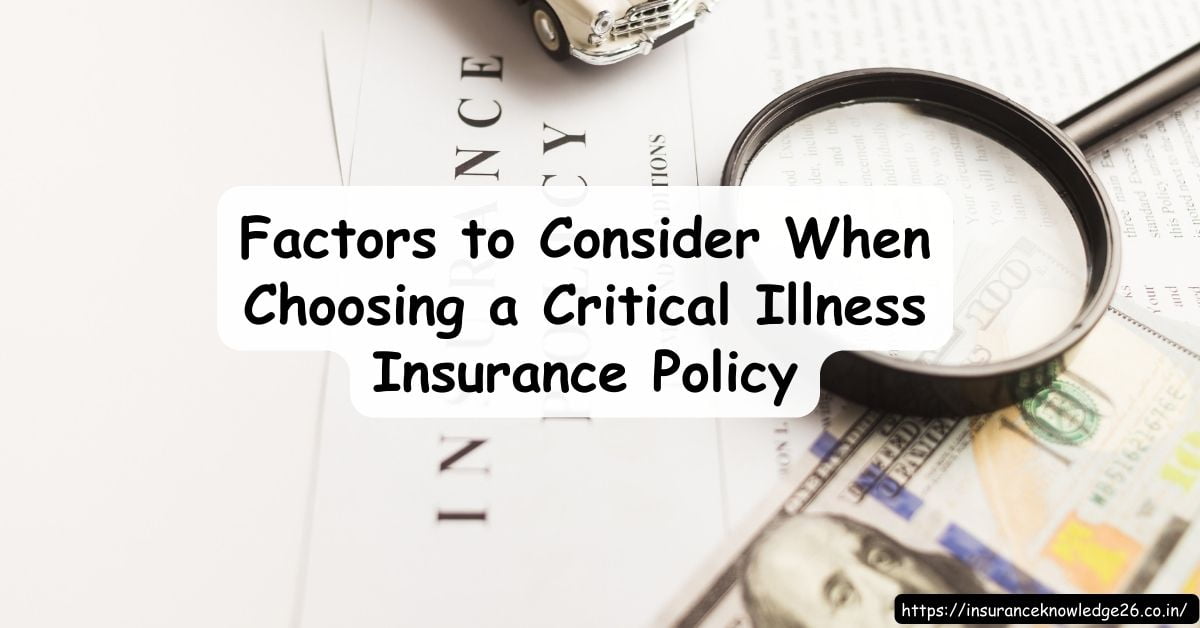In a world where medical uncertainties can impact anyone, critical illness insurance emerges as a crucial safeguard against the financial implications of serious health conditions. This insurance provides a lifeline by offering a lump-sum payment upon the diagnosis of a covered critical illness. However, the landscape of critical illness insurance is complex, and choosing the right policy requires careful consideration of various factors to ensure comprehensive coverage and financial security.

Understanding Critical Illness Insurance
Critical illness insurance is a specialized form of coverage that provides financial support to individuals diagnosed with specific severe health conditions. Unlike traditional health insurance, critical illness insurance offers a lump-sum payout that can be used to cover medical expenses, household bills, and other costs that may arise during the treatment and recovery process.
Coverage Scope and Limitations
When evaluating a critical illness insurance policy, it’s essential to understand the range of critical illnesses covered. Policies typically cover major health conditions such as heart attack, stroke, cancer, and organ failure. However, policies may vary in terms of the exact illnesses covered, so carefully review the policy’s list of covered conditions. Additionally, be aware of any exclusions or limitations in coverage that may affect your eligibility to make a claim.
Financial Benefits
One of the primary advantages of critical illness insurance is the financial security it offers. Upon the diagnosis of a covered critical illness, the policyholder receives a lump-sum payment. This payment provides flexibility, allowing individuals to use the funds according to their needs, whether it’s covering medical bills, seeking specialized treatment, or managing daily living expenses.
Policy Payout Structure
Critical illness insurance policies offer different payout structures that impact the amount of the lump-sum payment. A “level” payout structure provides a fixed amount regardless of when the claim is made, while a “reducing” structure decreases over time. An “increasing” structure sees the payout amount rise over time. Choosing the right payout structure depends on individual preferences and financial goals.
Waiting Period
Critical illness insurance policies typically have a waiting period before coverage becomes effective. This waiting period, also known as the “survival period,” ensures that policyholders don’t make claims for illnesses diagnosed shortly after purchasing the policy. Understanding the waiting period is essential to managing expectations and planning for potential health challenges.

Survival Period
The survival period is the duration an individual must survive after being diagnosed with a critical illness to qualify for a payout. Survival periods vary among policies and can range from 14 days to several months. It’s crucial to understand the survival period associated with your chosen policy, as claims made before the survival period ends may be invalid.
Pre-Existing Conditions
Some critical illness insurance policies exclude coverage for pre-existing conditions. A pre-existing condition is a health condition that existed before purchasing the policy. While most policies exclude coverage for pre-existing conditions within a specific period (usually the first two years), some policies may offer options to include coverage for certain pre-existing conditions. Make careful to read the policy’s pre-existing condition clauses.
Premium Costs
The premium for a critical illness insurance policy is the amount paid regularly to maintain coverage. Premiums are influenced by several factors, including age, health status, coverage amount, and the type of critical illnesses covered. It’s important to weigh the cost of the premium against the potential benefits and financial security provided by the policy.
Renewability and Policy Terms
Consider the renewability of the critical illness insurance policy and the age up to which the policy can be renewed. Some policies offer lifetime renewability, ensuring coverage as long as premiums are paid on time. Understanding the policy’s terms and renewal options is crucial to securing long-term coverage.

Coverage Amount
Selecting the right coverage amount is vital to ensure that the lump-sum payment adequately covers potential medical expenses and other financial needs. Assess your financial responsibilities, medical history, and potential costs when determining the appropriate coverage amount. A higher coverage amount may provide greater peace of mind but also comes with higher premiums.
Medical Underwriting
Critical illness insurance policies often involve medical underwriting, which assesses an individual’s health status and risks. Underwriting helps insurance providers determine premium rates and eligibility for coverage. Be prepared to provide accurate health information during the underwriting process to ensure transparent and accurate policy terms.
Riders and Add-Ons
Insurance providers may offer additional options or riders that can be added to a critical illness insurance policy. These riders can enhance coverage by offering benefits such as coverage for additional critical illnesses or waiver of premium in case of disability. Assess the value of each rider based on your specific needs and financial goals.
Waiting Period for Specific Illnesses
While most critical illness insurance policies have a waiting period that applies to all covered conditions, some policies may have an extended waiting period for specific critical illnesses. This means that a diagnosis of these illnesses must occur after the waiting period ends to qualify for a payout. Be aware of these variations when reviewing policy terms.
Claim Process
Understanding the claim process is essential for a smooth experience during a challenging time. Familiarize yourself with the steps involved in making a claim, the documentation required, and the timeline for receiving the payout. Knowing the process beforehand can alleviate stress when navigating health issues.
Network of Hospitals
Some critical illness insurance policies may have tie-ups with specific hospitals or healthcare providers. Being aware of these partnerships can impact your choices regarding treatment facilities and healthcare providers. Ensure that the policy’s network aligns with your preferences and convenience.

Policy Expiry and Renewal
Timely renewal of the critical illness insurance policy is crucial to maintaining uninterrupted coverage. Allow the policy to lapse, and you risk losing the protection it offers. Set reminders for renewal dates to ensure continuous coverage and financial security.
Provider Reputation and Customer Service
The reputation of the insurance provider matters significantly when choosing a critical illness insurance policy. Research the provider’s history, reviews, and customer service quality. A reputable provider offers transparent policies, efficient claims processing, and reliable customer support.
Comparing Policies
When choosing a critical illness insurance policy, don’t settle for the first option you come across. Compare policies from different providers to ensure that you’re getting the best coverage and terms for your needs. Pay attention to coverage details, premium costs, waiting periods, and additional benefits.
Selecting a critical illness insurance policy is a significant decision that requires careful evaluation of various factors. From coverage scope and financial benefits to waiting periods and policy terms, each aspect plays a role in determining the policy’s suitability for your needs. By understanding these factors and conducting thorough research, you can make an informed choice that provides peace of mind and financial security in the face of critical health challenges.
Disclaimer
The information provided in this post is based on general knowledge and may not be up-to-date or applicable to specific insurance products or regulations in your jurisdiction. Insurance policies and regulations can vary widely, so it’s essential to research and verify information with local authorities or insurance providers.

